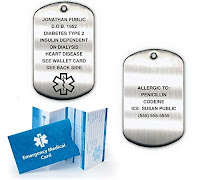1) All children should learn their full name, address, phone number, and parents' full names as soon as possible, well before kindergarten. My mother taught primary grades (k-3) and was constantly surprised by the number of her students each year who didn't know this basic information.
 2) Seriously consider getting your children "dog tags"
to wear with their name, address, and parent's name and contact info, along with blood type, allergies, and any other important
medical info. Dog tags work better than ID bracelets, in my opinion, because you can include a lot more information on a dog tag. Its also hard to find bracelets small enough to not easily slip off a small child's wrist.
2) Seriously consider getting your children "dog tags"
to wear with their name, address, and parent's name and contact info, along with blood type, allergies, and any other important
medical info. Dog tags work better than ID bracelets, in my opinion, because you can include a lot more information on a dog tag. Its also hard to find bracelets small enough to not easily slip off a small child's wrist. 3) All children should learn how to call 911 in an emergency.
4) Teach your children basic safety rules. Teach them about "stranger danger," to not open the door for people they don't know, and to not tell people over the phone that Mommy and Daddy aren't home. Teach them not to play with matches, guns, or knives, and to not run with scissors. Children, especially young children, really do need these reminders often.
5) Children should start learning first aid early on. I remember being taught basic first aid in school when we were in fourth grade. There's no reason whey we couldn't have started learning the basics even earlier.
6) Teach your children to make health and fitness a part of their lives. Teach them to eat healthy and to be physically active. Limit their screen time (TV, computer, gaming system, etc.), and make them spend some time outdoors. Better yet, teach by example. Activities such as walking, hiking, biking, camping, fishing, and gardening, can be dome as a family.
7) Scouting and 4-H clubs are great ways to help kids prepare. They will be active, learn new skills, build character, and learn self-reliance. Concerned about the Boy Scouts or Girl Scouts moving away from traditional values? It mainly depends upon the leadership of your local scout troop, so get to know the troop leaders. Or, consider Trail Life USA and American Heritage Girls as Christ-centered alternatives.
8) Teach your children gun safety. Two resources are the Eddie Eagle GunSafe Club (by the NRA) and the recently-released book Toys, Tools, Guns & Rules: A Children's Book About Gun Safety.
Remember, it is your responsibility to get your children prepared for whatever the future may hold. It is not the responsibility of government, the schools, or even your local church. It is your responsibility.
No comments:
Post a Comment
Comments are posted without moderation. Use caution when following links, and beware of SPAM and fake links. Please keep discussions civil and on-topic.